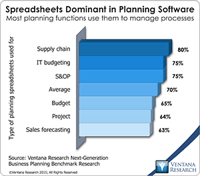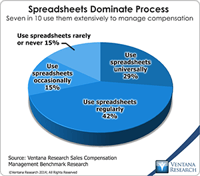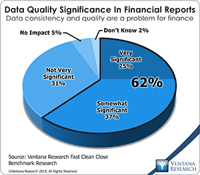The blockchain distributed database was invented to create the peer-to-peer digital cash called bitcoin in 2008. Although the future potential of bitcoin and other cryptocurrencies has been debated, the distributed ledger structure using a blockchain database that supports bitcoin is likely to be adopted for a range of commercial and governmental purposes. Distributed ledgers are a secure and transparent way to digitally track the ownership of assets while enabling faster transaction speeds and...
Read More
Topics:
Office of Finance,
Operational Performance Management (OPM),
Uncategorized,
Business Performance Management (BPM),
Customer Performance Management (CPM),
Financial Performance Management (FPM),
Sales Performance Management (SPM),
Supply Chain Performance Management (SCPM),
blockchain, distributed ledger, DLT, ERP, SCM, sup
I recently wrote about the challenge some companies will face in planning and budgeting when new revenue recognition rules go into effect in most countries in 2018. It’s important for companies that will be affected to be sure they have the appropriate systems, processes and training to handle the more difficult demands imposed by the new rules. With the change in accounting, the time lag between when a contract is signed and when a company recognizes revenue from it may be more variable and...
Read More
Topics:
Big Data,
Uncategorized,
Business Performance Management (BPM),
Financial Performance Management (FPM),
Sales Performance Management (SPM)
New standards governing accounting for contracts will go into effect for most companies in 2018. The Financial Accounting Standards Board (FASB), which administers Generally Accepted Accounting Principles in the U.S. (US-GAAP), has issued ASC 606, and the International Accounting Standards Board (IASB), which administers International Financial Reporting Standards (IFRS) used in most other countries, has issued IFRS 15. The two are very similar, and both will enforce fundamental changes in this...
Read More
Topics:
Sales,
Uncategorized,
Business Performance Management (BPM),
Financial Performance Management (FPM),
Sales Performance Management (SPM)
Workiva offers Wdesk, a cloud-based productivity application for handling composite documents. I use the term “composite document” to refer to those in which text is created and edited collaboratively by multiple contributors and which incorporates tabular and numerical data from multiple sources in a controlled process. Composite documents often have formats defined by law, regulation or contract and must be created at periodic intervals. To comply with the requirement by the United States...
Read More
Topics:
Mobile Technology,
Business Collaboration,
Cloud Computing,
Governance, Risk & Compliance (GRC),
Uncategorized,
Business Performance Management (BPM),
Composite Software,
Financial Performance Management (FPM)














